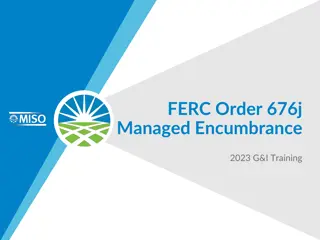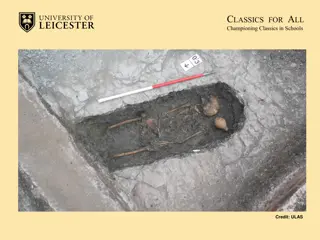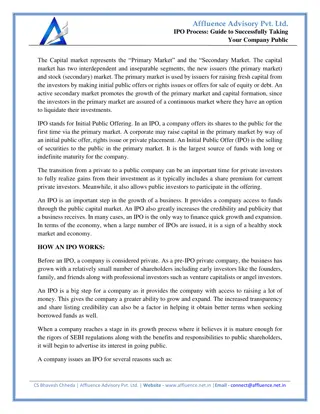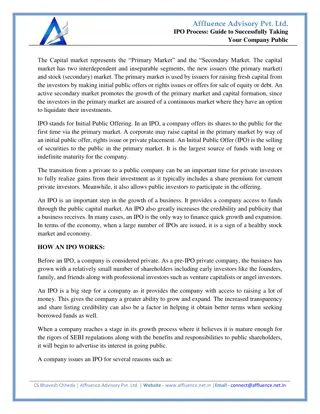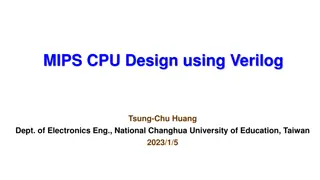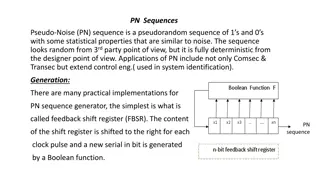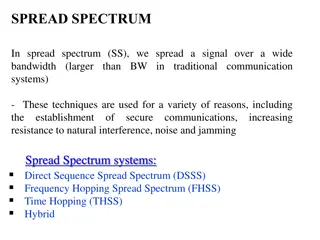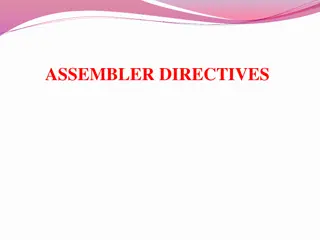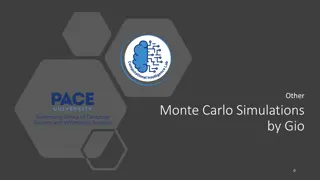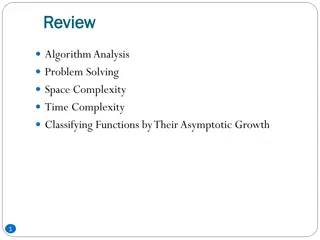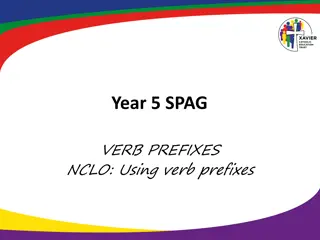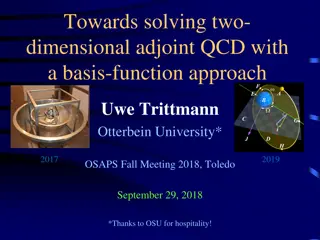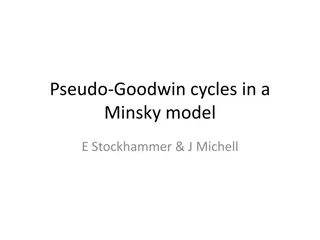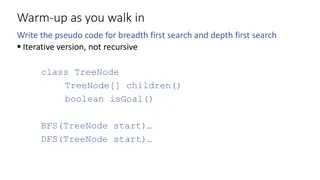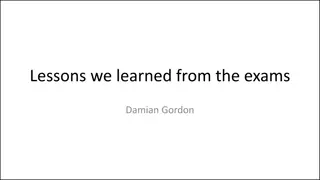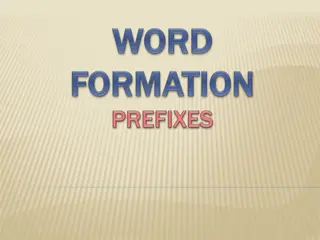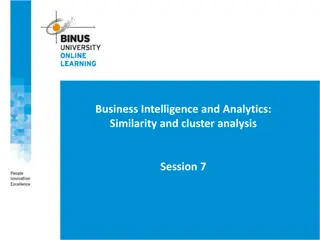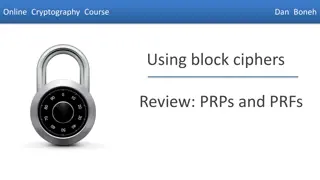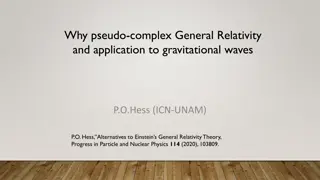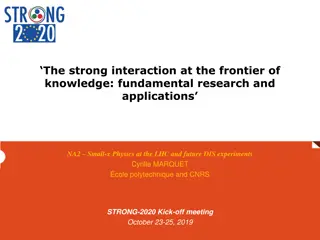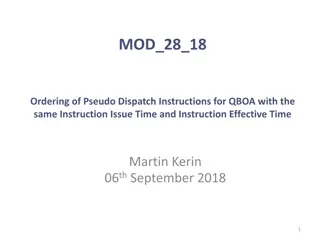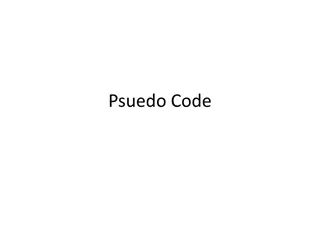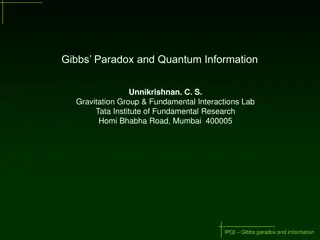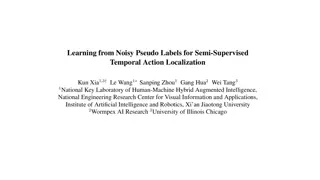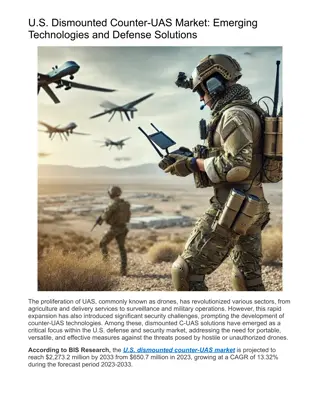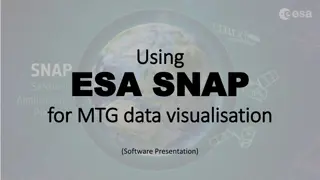Comprehensive Guide to FERC Order 676j Managed Encumbrance Process
This comprehensive guide provides step-by-step instructions on managing encumbrances under FERC Order 676j. Learn about creating new encumbrances, untagged pseudo-ties using PTP or NITS TSR, and accessing dynamic notifications within the system. Detailed images and clear explanations make this guide
1 views • 25 slides
Understanding Alkaloids: Sources, Names, and Classification
Alkaloids, organic nitrogenous compounds of plant origin, are physiologically active and can contain elements like carbon, hydrogen, nitrogen, oxygen, sulfur, and more. They are found in various plant families such as Leguminosae, Papaveraceae, and Solanaceae. Alkaloids can be sourced from plants, a
3 views • 21 slides
Understanding Tannins: Properties, Classification, and Medicinal Uses
Tannins are secondary metabolite products with astringent properties, high molecular weight, and various solubility and taste characteristics. They can be classified into true tannins and pseudo-tannins based on the Goldbeater skin test, as well as hydrolysable and condensed tannins based on chemica
6 views • 13 slides
Exploring Objects, Artifacts, and the Underworld: A Journey into History
Delve into the world of ancient artifacts, objects, and mythical realms through a captivating exploration of questions to ask about historical items and the mysterious Underworld. Discover insights about the makers, uses, and significance of various objects while unraveling the enigmatic realm of Di
2 views • 9 slides
IPO Process -Guide to Successfully Taking Your Company Public
An IPO enables companies to raise capital, enhance credibility, and drive growth by offering shares to the public. It involves a detailed process that can provide significant advantages, including increased visibility and financial opportunities. Dis
0 views • 6 slides
IPO Process -Guide to Successfully Taking Your Company public
An IPO enables companies to raise capital, enhance credibility, and drive growth by offering shares to the public. It involves a detailed process that can provide significant advantages, including increased visibility and financial opportunities. Dis
0 views • 6 slides
Pseudo-Scientific Ideas About Race and Eugenics in the USA and Australia
The eugenics movement in the USA, under leaders like Charles Davenport, promoted the separation of "inferior" races to prevent genetic contamination of the "superior" groups. Laws like the Virginia Racial Integrity Act enforced racial segregation and punished interracial marriages. This era saw the
1 views • 20 slides
MIPS CPU Design Using Verilog and Instruction Set Architecture Overview
Explore the world of MIPS CPU design using Verilog with a deep dive into Instruction Set Architecture (ISA), SPIM instruction formats, addressing modes, and more. Learn about the key components such as Program Counter (PC), Instruction Memory (IM), Register Files (RF), Arithmetic Logic Unit (ALU), D
1 views • 29 slides
Understanding Pseudo-Noise Sequences and Applications
Pseudo-Noise (PN) sequences are deterministic yet appear random, with applications in various fields such as communication security, control engineering, and system identification. Generated using shift registers, they exhibit statistical properties akin to noise. Linear and nonlinear feedback shift
1 views • 19 slides
Understanding Spread Spectrum Communication Systems
Spread spectrum techniques involve spreading a signal over a wide bandwidth for various reasons, such as secure communication, resistance to interference, noise, and jamming. This summary introduces Direct Sequence Spread Spectrum (DSSS), Frequency Hopping Spread Spectrum (FHSS), Time Hopping, and h
0 views • 25 slides
Understanding Assembler Directives and Symbols in Assembly Language
Assembly language is a low-level programming language used for computers, microprocessors, microcontrollers, and ICs. It consists of instructions and directives (pseudo instructions). Assembler directives are statements that guide the assembler during the assembly process. Categories of directives i
3 views • 39 slides
Patch Bundle Mode Walkthrough for Device Configuration
Explore the Patch Bundle Mode walkthrough consisting of flowcharts and pseudo code examples for controlling a device's patch mode, downloading configurations, and changing device modes. The content provides a detailed guide on using commands to initiate patch burst mode, specify I2C addresses, and t
0 views • 4 slides
Exploring Monte Carlo Simulations and Probabilistic Techniques
Dive into the world of Monte Carlo simulations and probabilistic methods, understanding the basic principles, the Law of Large Numbers, Pseudo-Random Number Generators, and practical Monte Carlo steps. Explore topics like conditional probability, basic geometry, and calculus through engaging exercis
3 views • 10 slides
Overview of Alkaloids: Classification, Sources, and Characteristics
Alkaloids are organic nitrogenous compounds found in plants with physiological activity. They may also contain elements like oxygen, sulfur, chlorine, and phosphorus. Alkaloids can be sourced from plants, animals, bacteria, fungi, or industrial synthesis. Their names can be derived from plant names,
0 views • 19 slides
Vocabulary Building: Prefixes for Negative Meanings
Explore the prefixes "dif-," "dis-," and "dys-" with words like disagree, disobey, differentiate, and disconnect to understand how they convey negative or opposite meanings. Engage with terms like dismiss, dispense, and differ to grasp the nuances of language when expressing disagreement or non-comp
0 views • 19 slides
Understanding Reasonable Arguments vs. Pseudo-Arguments
The provided content focuses on distinguishing between reasonable arguments and pseudo-arguments through thought-provoking questions such as the ethical treatment of animals, city subsidies for sports venues, and subjective opinions on aesthetics. It also explains the structure of an argument, highl
0 views • 18 slides
Understanding Pseudo Code and Flow Charts for Algorithm Analysis
Explore the concepts of pseudo code and flow charts for analyzing algorithms, problem-solving, and understanding space and time complexity. Learn about basic elements of pseudo code, assigning operations, and writing effective pseudo code statements in a clear and structured manner. Discover the imp
0 views • 26 slides
Understanding Verb Prefixes - Year 5 SPAG
Explore the concept of verb prefixes in Year 5 SPAG, including examples like "un-", "dis-", "re-", "de-", "mis-", and "over-". Understand how prefixes alter word meanings and learn to add prefixes to root words. Dive into activities and visuals to enhance comprehension.
0 views • 12 slides
Algebraic Solutions for Two-Dimensional Adjoint QCD
Two-dimensional adjoint QCD is explored with a basis-function approach aiming to achieve single-particle states over cluttered multi-particle states. The algebraic solution involves t'Hooft-like integral equations and pseudo-cyclicity considerations to address parton number violation and boundary co
0 views • 22 slides
Phonic Screening Checks Bank of Words 2012-2019
Explore real and pseudo words featuring various phonetic patterns such as CVC, CCVC, CVCC, CVVC, CCVCC, VCC, CVVV, CCVVV, CVCV, CCVCV, CCCVCC, CCCVC, CCCVV, and more from Phonic Screening Checks between 2012 and 2019.
0 views • 420 slides
Exploring Pseudo-Goodwin Cycles in a Minsky Model
This paper delves into the dynamics of Pseudo-Goodwin cycles within a Minsky model, examining the counter-clockwise movement of output and wage share. It distinguishes between true Goodwin cycles and pseudo variants, highlighting the role of income distribution, debt, and demand in shaping economic
0 views • 27 slides
AI Search Algorithms: BFS and DFS Pseudo-code Iterative Version
Explore the iterative versions of Breadth First Search (BFS) and Depth First Search (DFS) with pseudo-code examples implemented for class TreeNode. Understand the concept of TreeNode, children() function, isGoal() method, and apply BFS and DFS starting from TreeNode start.
0 views • 53 slides
Key Learnings from Exams: Algorithm Strategies & Representations
Exploring vital lessons from exams, including algorithm development tips, representation examples, and pseudo-code explanations. Understand the importance of reading questions carefully, creating precise steps, and terminating algorithms effectively. Dive into the world of algorithms, pseudo-code, a
0 views • 44 slides
Prefixes Practice and Composition Writing for Language Development
Practice forming words with various prefixes like "il-", "im-", "in-", "ir-", "dis-", "mis-" and then apply them in sentences to enhance vocabulary skills. Additionally, imagine being a teacher dealing with a naughty student in a primary school setting. Explore different scenarios and dialogues to i
1 views • 9 slides
Lessons in Unity and Strength from Aesop's Fables
A Greek slave named Aesop became renowned for his timeless fables that continue to resonate today. Through a story of a farmer and his sons, the message of unity's strength is beautifully conveyed. The narrative emphasizes how together, challenges can be overcome with ease by staying united, just li
0 views • 32 slides
Understanding Similarity and Cluster Analysis in Business Intelligence and Analytics
Explore the concept of similarity and distance in data analysis, major clustering techniques, and algorithms. Learn how similarity is essential in decision-making methods and predictive modeling, such as using nearest neighbors for classification and regression. Discover (dis)similarity functions, n
0 views • 35 slides
Nova Scotia Drug Information System (DIS) Overview for Patient Safety
Nova Scotia's Drug Information System (DIS) focuses on patient safety by minimizing adverse events related to drug interactions, contraindications, and medication errors. The system includes comprehensive medication profiles, allergy alerts, and e-Prescribing capabilities to aid healthcare providers
0 views • 14 slides
Understanding Secure PRFs and PRPs in Cryptography
Dive into the world of secure Pseudo-Random Functions (PRFs) and Pseudo-Random Permutations (PRPs) in cryptography. Learn about the definitions, security criteria, and examples of secure PRFs and PRPs such as 3DES and AES. Explore the concepts of secure block ciphers and key principles behind these
0 views • 54 slides
NCSD DIS Mini Conference 2023 Highlights
NCSD DIS Mini Conference 2023 featured updates on Disease Intervention Training Centers, DIS Certification, EPT Initiatives expansion, and innovative practices in Iowa and North Dakota. Presentations covered valuable resources, program overviews, challenges, and outcomes in the field of Disease Inte
0 views • 22 slides
Exploring Pseudo-Complex General Relativity for Gravitational Waves
Delve into the concept of pseudo-complex General Relativity (PC-GR) as an alternative theory to Einstein's General Relativity. The study considers algebraic extensions, weak field limits, and the extension of metrics in momentum-energy space. By analyzing predictions and implications, this research
0 views • 21 slides
Exploring Small-x Physics at the Frontier of Knowledge: Strong Interaction Research
Delve into the forefront of knowledge with fundamental research and applications in Small-x Physics at the LHC and future DIS experiments. The STRONG-2020 kick-off meeting in 2019 marked the collaboration of 15 institutions from 9 countries, aiming to enhance communication and collaboration in the t
0 views • 10 slides
Pseudo-Tie Business Procedure Tariff Administration, August 2017
Pseudo-tie business procedure tariff administration from August 2017 outlines the purpose, implementation, and types of pseudo-ties in the energy industry. It covers dynamic transfers, pseudo-tie procedures, and various stakeholder involvements. The document details the process of implementing pseud
0 views • 11 slides
Understanding Pseudo-Tie Entry in Electric Industry Registry
Explore the requirements and measures of NERC Standard INT-004-3.1 for dynamic transfers in the electric industry. Learn about data fields required for pseudo-tie entry and approval methodology in the Electric Industry Registry. Discover the publishing schedule for EIR entries and the approval proce
0 views • 6 slides
Ordering of Pseudo Dispatch Instructions for QBOA
This document outlines the specific order in which Pseudo Dispatch Instructions (DIs) are to be arranged for QBOA in scenarios where multiple instructions are issued simultaneously. The order prioritizes certain instructions to maintain consistency and alignment with system implementation rules.
0 views • 11 slides
Understanding Pseudo Code: A Beginner's Guide to Organizing Programs
Pseudo code is a helpful way to organize your program logic before actual coding. It provides a structured outline from inputs to outputs, focusing on step-by-step guidelines that are not language-specific. This guide covers the basics of pseudo code, including general guidelines, steps to pseudo co
0 views • 29 slides
Gibbs Paradox and Quantum Information: Understanding Entropy and Resolution
Description of the Gibbs problem of entropy mixing gases, conventional resolution, issues of (dis)continuity, the role of indistinguishability and quantum mechanics in resolution, dissenting views, necessity of quantum mechanics, and the relationship between statistical mechanics and entropy. Key di
0 views • 19 slides
Handling Label Noise in Semi-Supervised Temporal Action Localization
The Abstract Semi-Supervised Temporal Action Localization (SS-TAL) framework aims to enhance the generalization capability of action detectors using large-scale unlabeled videos. Despite recent progress, a significant challenge persists due to noisy pseudo-labels hindering efficient learning from ab
0 views • 30 slides
U.S. Dismounted Counter-UAS Market: Emerging Technologies and Defense Solutions
The U.S. dismounted counter-UAS market is projected to reach $2,273.2 million by 2033 from $650.7 million in 2023, growing at a CAGR of 13.32% during the forecast period 2023-2033.\n\nRead Report Overview: \/\/bisresearch.com\/industry-report\/us-dis
1 views • 3 slides
Violence Against Women with Disability: Theoretical and Legal Barriers
Troubling the assumed dis/connections between gender, disability, the human, law, violence, and feminism. Examining epistemological, material, legal, political, and ontological limitations in addressing violence against women with disability. Discusses the prevalence, forms, and implications of viol
0 views • 11 slides
Utilizing ESA SNAP for MTG Data Visualization
In this software presentation, the use of ESA SNAP for visualizing MTG data is explored. The SNAP SeNtinel Application Platform, a joint development by Brockmann Consult, SkyWatch, and C-S, provides a common architecture for all Sentinel Toolboxes. Resources for accessing SNAP, including downloads,
0 views • 5 slides
